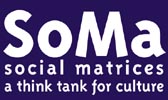
PEER2PEER
SEMINAR 1
Royal College of Art, London
Monday 2 April 2001
A one-day seminar to bring together artists, designers, curators, researchers and others involved or interested in using converging communications networks and technologies for delivering and developing experimental, artistic and cultural projects.
The event explored questions of access to emerging networks and the potential for new kinds of cultural and artistic spaces to emerge as broadband, wireless and ubiquitous computing affect and further mesh public and private spaces.
Five short presentations were made as the starting off point for discussions around how to facilitate collaborations and exchanges between academia, the cultural sector and industry. Representatives from industry and government/ regulatory bodies were invited to make presentations on future developments and meet potential collaborators.
Chairs:
Giles Lane & David
Sinden (Lighthouse,
Brighton)
Presentations: Lucy Kimbell; Don
Foresta (Marcel);
Philip Phelan; Caroline
Griffiths (OmniSky);
Rory Hamilton &
Jon Rogers (RCA
CRD).
Participants
included individual artists and designers, as well as people from:
Nortel Networks, Orange, Thought Interactive, OmniSky
International, Department of Trade & Industry, Arts Council of England,
South East Arts, Rockefeller Foundation, Royal College of Art, London
School of Economics, University of Westminster, University of Plymouth,
University College London, Birkbeck College, University of East London,
University of Oxford, University of Vienna, Foundation for Information
Policy Research, Institute of Contemporary Arts, Blast Theory, Tate Modern,
Wimbledon School of Art, Dartington College of Art, Hull Time Based Arts,
CPLEX & b.tv
-
the changing cultural and social ecology of public and private spaces
-
how to work with industry and government and with whom
-
the global versus the local or, ubiquitous computing versus local specificity or, universal machines versus embedded devices
-
the role of art and design in intervention and collaboration: research rather than product driven activity, stimulation rather than consumption
-
the dichotomy between content and infrastructure, or their enmeshing
These were meant to help frame the day's discussions, but not to be prescriptive.
11am: welcome and introduction
11.15 am - 12noon: individual presentations
12noon-1pm: 1st group discussions
1pm-1.30pm: working lunch / individual presentations
1.30-2pm: 1st groups presentations
2pm-3pm: 2nd group discussions
3pm-3.30pm: 2nd groups presentations
3.30pm-4pm: general discussion
4pm: close
![]()
Last
updated
February 14, 2004
© 2001-2003 Proboscis. All Rights Reserved.